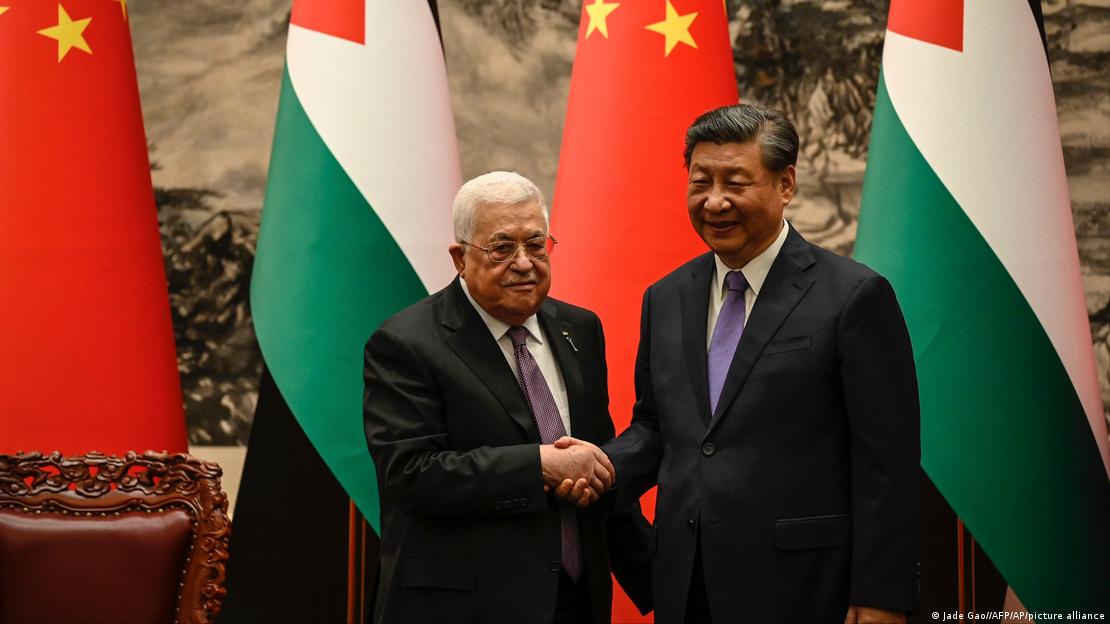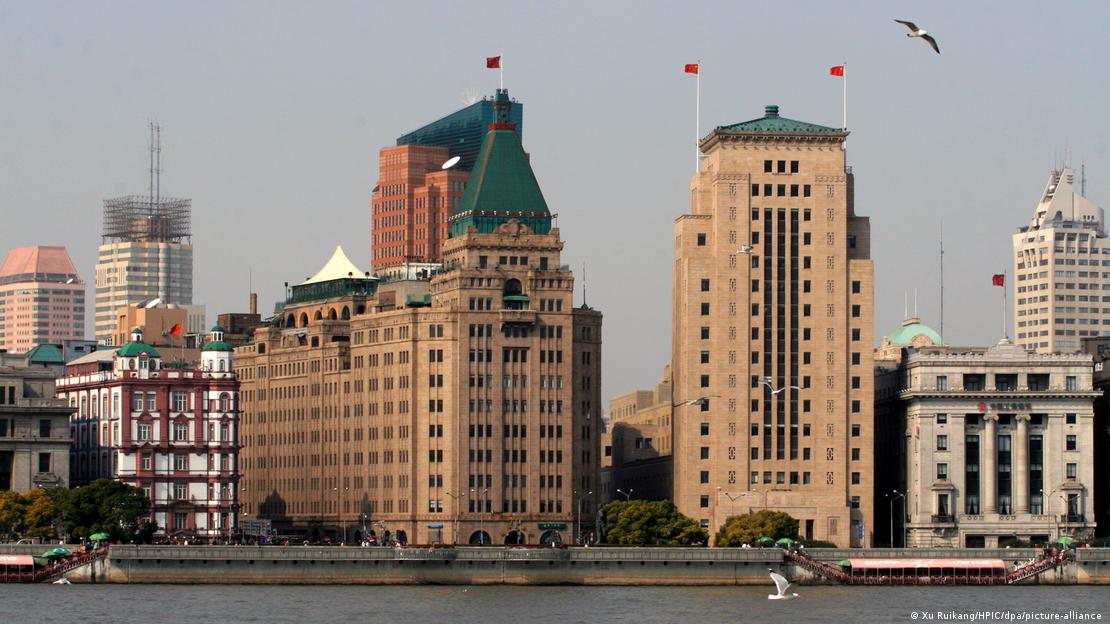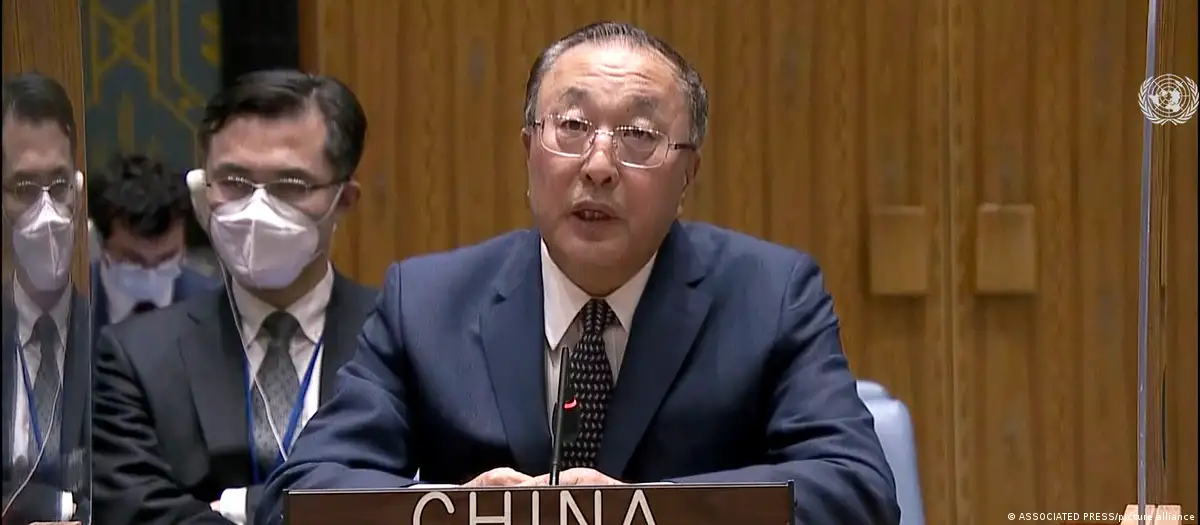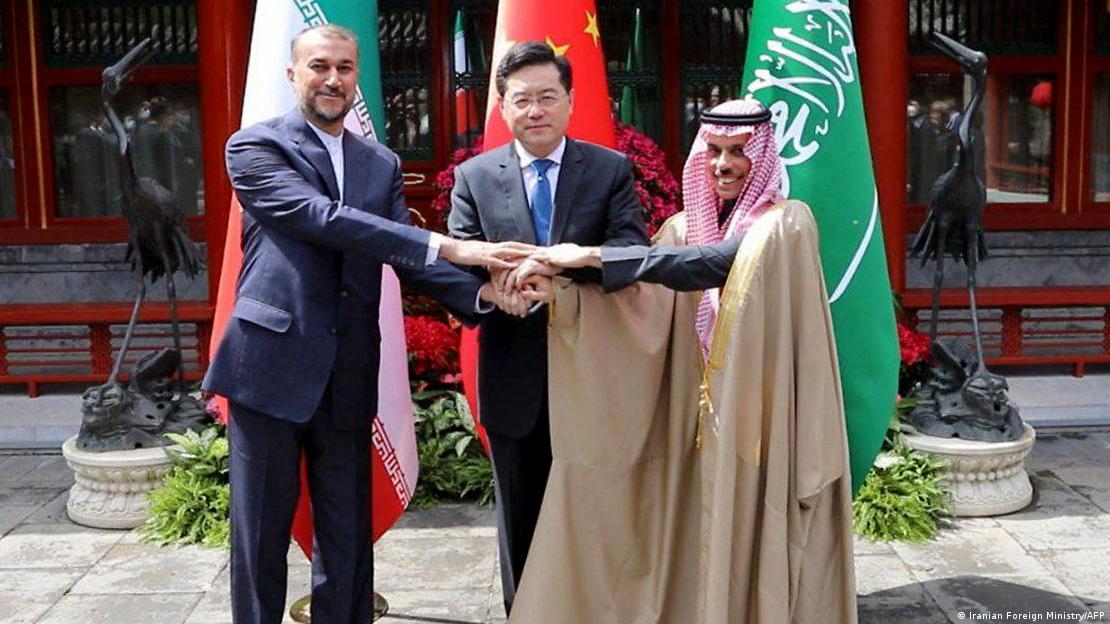What's China's stance on the Israel-Hamas conflict?

Standing on the banks of the Huangpu River in the Chinese financial metropolis of Shanghai, you can't miss a tall building with a green copper roof. Today's Peace Hotel has hosted guests of state such as U.S. presidents Ronald Reagan and Bill Clinton, as well as stars like Charlie Chaplin and George Bernard Shaw.
What is less well known is that until 1949 the hotel was called the Cathay Hotel. Built in 1929 by Jewish entrepreneur Victor Sassoon, it was the city's tallest building for several years.
Sassoon moved to Shanghai in the 1920s and established a business empire there. During the Second World War, with his support, a settlement of around 2.5 square kilometres was built, where around 20,000 Jews from Europe found refuge from Nazi persecution.
After the war and the Communist takeover, however, most Jews left Shanghai. Victor Sassoon was forced to sell his companies to the Chinese Communist Party for a pittance.
The Sassoon case illustrates how the Communists treated the Jews and later the young state of Israel: with prejudice. During the Cold War, China consistently declared its solidarity with its Arab allies and invariably voted against Israel at the UN. It was not until 1992 that China and Israel officially established diplomatic relations.

Trade with Israel top priority
Since this normalisation, Israel has primarily been a trading partner for China. Goods worth 22 billion dollars were traded with Israel in 2023, which corresponds to the trade balance between China and EU member state Sweden.
Israeli Prime Minister Benjamin Netanyahu had been due to travel to China in October 2023. His agenda would have included the conclusion of a free trade agreement with China. His visit was postponed owing to the militant Islamist Hamas terrorist attack on Israel.
Official documents from both countries focus almost exclusively on the economy and trade. The conflict in the Middle East has never been the main topic. The final declaration following Netanyahu's last visit to Beijing in 2017, for example, merely stated that China wanted to promote joint innovation with Israel and support high-tech start-ups.

China views Israel primarily as a U.S. ally
At the same time, China has always drawn a direct political line between Israel and the USA, Beijing's major geopolitical rival.
Chinese UN Ambassador Zhang Jun, who took over the chair of the UN Security Council in November, said: "China calls on the major power that has the greatest influence over the party concerned to put aside its own interests and geopolitical considerations and make every effort to end the war and restore peace."
Zhang Jun was referring to the USA, which he implicitly accused of having an interest in the war.
"Israel is a consolidated democracy, firmly anchored in its alliance with the United States of America," says Eberhard Sandschneider, political scientist and partner with the consulting firm Berlin Global Advisors.
"From a Chinese perspective, Israel is therefore geopolitically on the other side of what China is currently planning, namely a strengthening of the anti-Western alliance."
Those critical of Israel and "clueless morons"
The anti-Western sentiment is also being reflected in the People's Republic's online forums, which are closely monitored by Chinese censors. The hostilities are perceived as "terrorisation of the weaker Muslim people by the clearly superior Jewish people". It is a racist stereotype that is widespread on Chinese social media.
Users of Weibo, the most popular platform in China, are also aware that the German government "unwaveringly" stands by Israel. Hundreds of anti-Semitic comments can be found in response on the German embassy's page. "Aggressors!" writes one user with the name "Hi, niger ager". The post continues: "The Nazis in Germany and Israel have united and are standing together against humanity."
The German diplomatic mission's response to this and similar posts was unequivocal and very direct: "It's pretty stupid to indiscriminately label anyone a Nazi. If you combine the flag of Israel with a swastika in your profile picture, you are either a clueless moron or an unscrupulous bastard. Such accounts will be blocked by us."

Palestine – relevant for China
In contrast to the public opinions of private individuals, the government in Beijing claims to be a neutral player in the Middle East conflict. Nevertheless, China has criticised Israel in particular.
Wang Yi, China's Foreign Minister, has labelled the Israeli hostilities "disproportionate". They far exceeded the limits of self-defence. The people in Gaza should not be collectively punished, Wang continued. In the UN Security Council, UN Ambassador Zhang said he wanted to take account of the legitimate security interests of both warring parties and restore peace.
Beijing is not in regular contact with the Islamist terrorist organisation Hamas, which controls the Gaza Strip. However, it does communicate with the PLO (Palestine Liberation Organisation) leadership in the Palestinian territories, which have been recognised as a state by 138 countries around the world, but not by Israel, the USA or Germany. China signed a "comprehensive strategic partnership with Palestine" in summer 2023.
The final communiqué of 14 June 2023 following talks between President Xi Jinping and Palestinian President Mahmoud Abbas stated: "China supports the establishment of a sovereign state of Palestine on the basis of the 1967 border demarcation and with East Jerusalem as its capital. China supports the resumption of peace talks between Palestine and Israel on the basis of the principle of 'land for peace', the relevant UN resolutions and the two-state solution".

"The aim is to rob the Uighurs of their identity"
Hundreds of thousands of Muslim Uighurs are being held in "re-education" camps in Western China. The more pressure the ethnic group faces from Beijing, the more important their Islamic beliefs become, says sinologist Kristin Shi-Kupfer in conversation with Luise Sammann
Palestinians silent on Xinjiang human rights violations
In return, Palestine, represented by the PLO, committed itself to the "one-China policy", i.e. that the People's Republic is the only legitimate government of China. Palestine has also adopted the Chinese narrative that the predominantly Muslim autonomous region of Xinjiang is "not at all about human rights issues, but about fighting terrorism, radicalisation and separatism".
Beijing has been installing a comprehensive surveillance apparatus in Xinjiang for years in order to monitor the Uighurs. The United Nations has denounced "serious human rights violations" and sees possible "crimes against humanity" in Xinjiang.
According to political scientist Sandschneider, China has always maintained close political ties with the PLO. "There are historical reasons for this. Supporting liberation movements is part of the self-image of Chinese foreign policy." But not when it comes to Xinjiang or Taiwan.
In this context, China is looking for supporters in the Arab world to defend its repression of the Uighurs. If Beijing were to lose support in the Arab world, the separatist forces in Xinjiang might attract more support from Muslim countries. Uprisings by the national minorities would be the worst-case scenario for the Communist Party leadership, for whom the unity of China is a top priority.
China – Middle East mediator
China has had a special envoy for the Middle East since 2019. Among other things, this envoy has been tasked with promoting peace between Israel and its Arab neighbours. Since the outbreak of the war between Israel and Hamas, China's current envoy Zhai Jun has been in contact with various parties and several Arab countries. He has stated that China is in favour of peace and sees "the failure to protect the legitimate national rights of the Palestinian people" as the cause of the ongoing conflict. He emphasised that China and Russia shared the same position on the conflict and were working together to de-escalate it.
The emphasis on proximity to Russia follows a pattern. In recent years, China has increasingly focused on non-Western partners, while at the same time significantly increasing its global visibility, said Sandschneider. "China had essentially stayed out of the Middle East conflict in recent decades. But now we are seeing China positioning itself as a mediator, as it has done between Saudi Arabia and Iran."
In April 2023, China successfully initiated a rapprochement between the two Gulf rivals, making global headlines as a mediator. Sandschneider believes that such a success is unlikely to be repeated in the war between Israel and Hamas: "China's credibility in this unique case between Israel and Hamas is pretty limited."
Dang Yuan
© Deutsche Welle 2023
